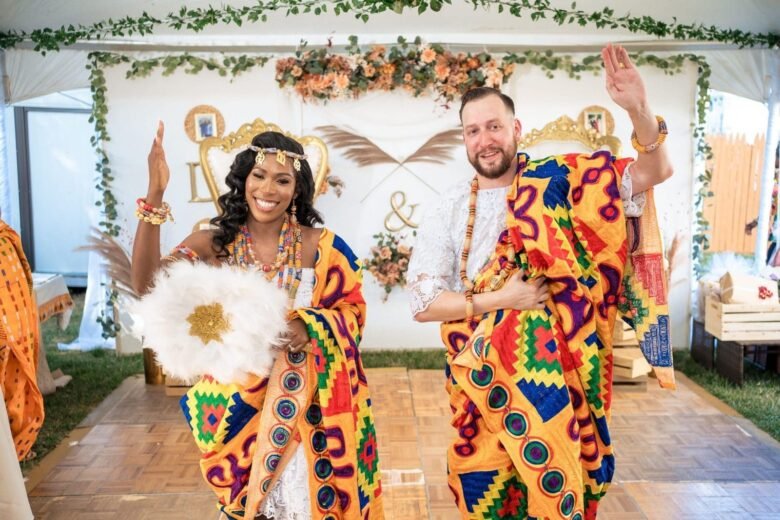Attending a Ghanaian wedding is an unforgettable experience filled with vibrant colors, heartfelt traditions, lively music, and strong family ties. It’s more than a celebration of love—it’s a cultural display of heritage, community, and joy. Whether you’re a guest of honor or a curious traveler invited by locals, a Ghanaian wedding offers a window into the heart of the country’s social fabric.
This guide walks you through the different stages of a typical Ghanaian wedding, what to expect as a guest, how to dress, and how to participate respectfully and joyfully.
The Two-Part Wedding Tradition in Ghana
Most Ghanaian couples go through two distinct ceremonies: the traditional marriage and the white wedding. These may happen on separate days or the same weekend, depending on the couple’s preferences and family traditions.
1. Traditional Marriage (Customary Wedding)
This is the most culturally significant part of the marriage process. Families play a central role, and customs vary by ethnic group.
Key Elements:
- “Knocking” (Kokooko): The groom’s family formally visits the bride’s family to request her hand in marriage. Gifts like schnapps, kola nuts, money, or cloth are presented.
- Bride Price Presentation: The groom’s family brings items listed by the bride’s family. This could include money, fabric, jewelry, drinks, or even a Bible.
- Family Blessings: Elders from both families give their blessings, often through libation or prayer.
- Name Announcement: The couple is declared married by both families.
- Exchange of Rings or Gifts: In some traditions, the couple may exchange rings, beads, or traditional garments.
- Feasting and Celebration: Food, music, and dancing follow the formal rites.
Regional Variation: Among the Akan, Ashanti, Ga, Ewe, and northern ethnic groups, customs differ slightly—but the principles of family, respect, and union are central throughout.
2. White Wedding (Western-Style Ceremony)
Typically held in a church or event venue, the white wedding mirrors Western Christian traditions and includes vows, a wedding dress, and a formal reception.
What to Expect:
- The bride wears a white gown, and the groom wears a suit or tuxedo.
- The ceremony includes Christian prayers, readings, vows, and ring exchange.
- A large reception with a decorated hall, bridal party dances, a cake-cutting ceremony, speeches, and lots of food and drinks.
What Guests Should Expect
1. Dress Code
Ghanaians take pride in their appearance—weddings are a fashion showcase.
- Traditional Attire: Most guests wear custom-made African prints or Kente outfits, often in colors chosen by the bride and groom (called the aso ebi or wedding theme).
- Western Attire: At the white wedding, guests may opt for suits and gowns, but traditional attire is still widely accepted.
- Tip: If you’re close to the couple, they may share the wedding fabric with you weeks in advance for custom tailoring.
2. Punctuality
Ghanaian events often operate on “Ghana Man Time,” meaning things rarely start exactly on time. Be prepared to wait or enjoy the social atmosphere until things get going.
3. Gifts and Contributions
- Guests are expected to bring gifts—household items, cash, or envelopes (abusuapayin).
- Some couples use mobile money or wedding registries, but cash remains common.
- If unsure, ask a family member what’s appropriate.
Highlights of a Ghanaian Wedding Celebration
Color and Fabric
Bright colors and bold patterns are everywhere—especially Kente cloth, which symbolizes royalty and pride. Guests often wear coordinated outfits made from the same fabric, showing support and unity with the couple.
Music and Dance
Expect traditional drums, highlife, Afrobeat, and gospel music. The bride and groom often make a grand entrance with choreographed dance moves. Guests will join in dancing, clapping, and spraying cash (dash) as a show of appreciation and support.
Food and Drink
Feasting is a major part of Ghanaian weddings. Common dishes include:
- Jollof rice, fried rice, or waakye
- Grilled chicken, goat, or fish
- Banku and tilapia, kebabs, and kpakpo shito
- Soft drinks, juices, and sometimes alcoholic beverages depending on the couple’s faith or tradition
There’s usually more than enough for all, and guests are often encouraged to “take away” food at the end.
Etiquette and Cultural Tips
- Greeting elders: Always greet older guests respectfully; a handshake with a slight bow shows deference.
- Ask before filming: Photography is usually welcome, but be cautious during spiritual or emotional moments.
- Be generous when spraying money: If you join the dance floor to celebrate the couple, it’s common to spray small bills or coins as a blessing.
- Respect faith-based customs: If the couple is Muslim or deeply Christian, be mindful of dress codes and rituals.
Joining the Celebration as a Foreigner
You don’t need to be Ghanaian to enjoy the celebration. Locals are welcoming and often delighted to share their culture.
Here’s how to join in meaningfully:
- Attend with a local friend or guide, if possible.
- Wear traditional fabric—tailors can make an outfit in 1–3 days.
- Learn a few Twi or Ga phrases like “Ayekoo” (Well done) or “Medase” (Thank you).
- Ask questions after the ceremony to better understand what you witnessed.
When Do Ghanaian Weddings Take Place?
Weddings happen year-round, but the most popular times are:
- December holidays (a busy wedding season known as “wedding December”)
- Weekends, especially Saturdays
- Public holidays, when guests are free to attend
Final Thoughts
A Ghanaian wedding is more than a marriage—it’s a celebration of family, culture, ancestry, and joy. From the symbolic traditional rites to the high-energy reception, every element is layered with meaning and community participation. If you’re fortunate enough to be invited, go with an open heart, a respectful spirit, and a willingness to dance—you’ll leave with unforgettable memories and a deeper appreciation of Ghanaian hospitality.




